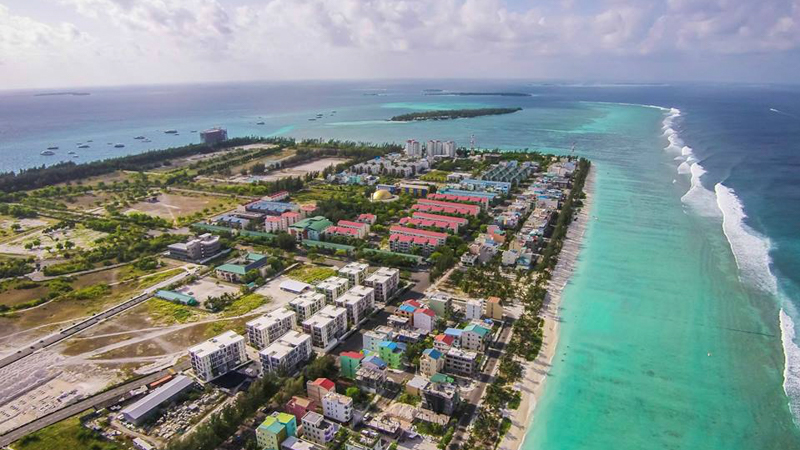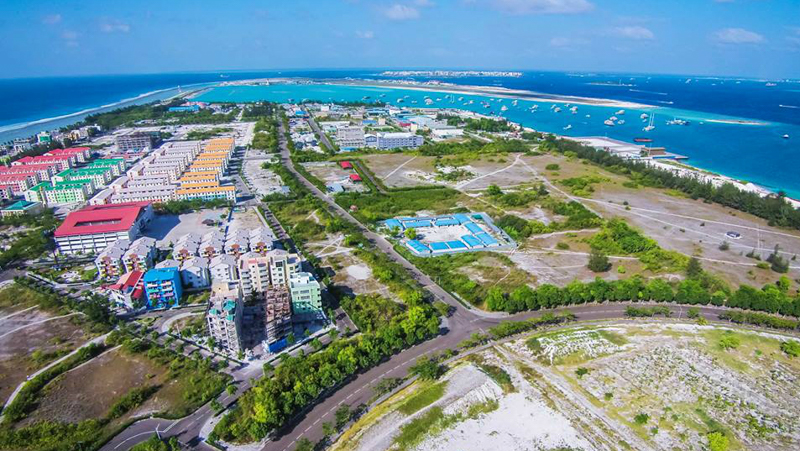It was 23:30, a large number of people were gathered outside Hulhumalé ferry terminal in Malé, the kind of crowd that usually gathers around a crime scene. But no crime was committed there – no police lines visible.
The people were gathering there to board the ferry to Hulhumalé – an extension of Malé City separated by sea, one of the greater Malé islands. Ferry service staff in blue uniforms were guarding the entrance to three tightly packed terminal waiting areas, as those outside anxiously awaited news of an extra ferry that might shorten the otherwise two-hour wait.
Adam Humam, a tour guide who lives in Hulhumalé hears nothing but complains about the ferry service:
“Look at this ferry, this thing is like a sauna most of the time. One will need to take a shower after traveling on this. Just look at how they have arranged the seats, we have to sit so tightly packed” Humam said, leaning away from the chair to avoid bumping into the next passenger.
The ferry concerned was an average wooden Dhoni, furnished with ten rows of plastic chairs screwed to the floor. The gangway led to two rows of motorbikes at the rear of the boat. Most windows on both sides were shut by the people adjacent, to shelter from occasional splashes of water. A few travellers stood at the back of the ferry – unable to find a seat. The smell was a mix of sea, old wood, and bodily odors.
With few exceptions, almost everyone who were interviewed about the 20 minute ferry service was unhappy with the service. The conditions of the ferry, the terminal and timings – it was all unsatisfactory for most questioned. Just a few long- time residents of Hulhumalé recalled the ferry services having improved significantly in the past decade.
Hulhumalé – a reclaimed landmass measuring 2 square kilometers off the north-east coast of Malé City – is home to an estimated 20,000 people. First settled in May 2004 with just one thousand people, the population of Hulhumalé is expected to double to 60,000 by 2020. The ferry service, operated by the Maldives Transport and Contracting Company (MTCC), is clearly finding it hard to cater to Hulhumalé’s population boom.
The MTCC has often said the ferry operation is not profitable at current rates, though Malé City Mayor Maizan Ali ‘Alibe’ Manik says that company can manage by investing in lands provided for them to subsidise the service. The Housing Development Corporation (HDC) – the government owned corporation mandated with the development and management of Hulhumalé – remains uninvolved in the MTCC’s operations. The transport authority, however, does have a mandate to monitor and regulate all ferry services in the country.
How is the service?
“What can I say? My wife and I moved to Hulhumalé three years back, and riding this ferry to and fro every day has been nothing but a pain. I developed a pilonidal sinus, and the doctor says it is sitting for such a long time and the terrible vibrations these boats give” said a young man in his late twenties.
Another couple who moved to Hulhumalé very recently had a different complaint, fearing the procedure of getting their motor bike on to the ferry – riding over a metal sheet placed against the ferry – could damage it over time.
Leevan Shareef, a vocal critic of the Hulhumalé ferry service on Twitter, sometimes has to spend two hours commuting between Hulhumalé and Malé. The MTCC does not increase ferry services during busy days – such as when political rallies are held in Malé – or on Friday evening, when a lot of people visit Hulhumalé, he complained.
“We complain to the ferry crew or staff at the counter, they will always say the issue will be brought to the attention of superiors. But there is no news of these superiors ever,” he said.
Mahdi Shahid, Deputy Principal of Lalé Youth International School, was among the first people to use the ferry service. His view was that the ferries have improved in the past ten years.
“Looking back, I would say it has actually improved a lot. Back then the ferry docked at the far north of the island, there were no trees, there was nothing over there. And we had to walk all the way from there to the school. It was a very small ferry then, but now the ferries are bigger and they travel more frequently,” Shahid explained.
“I think the current service would be okay, if the population wasn’t increasing so rapidly. but with the current population growth I think there should be an increase in number of ferries now. What I’m looking for is getting on the ferry and leaving without having to wait there for so long,” he added.
Currently the ferries operate between 05:30am and 02:30am, with eighty-two rounds between the two islands every day except for Fridays when ferries services are interrupted briefly for prayers.
Not profitable
Though the MTCC was unwilling to discuss the ferry service with the media, some ferry crew and staff noted that there were many challenges facing the company.
One such issue was that of Malé harbor, which they noted did not allow several ferries to operate simultaneously. “Sometimes we have to wait five minutes outside the harbor entrance, waiting for other ferries including those leaving for Hulhulé [the airport island] to leave,” said one crew member.
Four months ago, ferryboat owners – who lease their boats to the MTCC – went on strike after a failure to receive payments. The MTCC blamed this on delays in receiving payments from various government projects undertaken in various parts of the country. The company has often reiterated that its operations are not profitable at current rates. Ferry rates have risen at least twice since operations began in 2004, though other attempts to increase prices have been met with protests from Hulhumalé residents, usually ending with interventions from the city council and HDC.
In 2012, transport services in the Malé region contributed to thirteen percent of the MTCC’s operating profits, however the net loss in this sector has been gradually increasing over the past five years. The loss for transport services in the Male’ region in 2012 was reported to be MVR15.69 million (US$1 million).
Finding a solution
While accepting there are challenges in providing this service, Malé City Mayor “Maizan” Ali Manik (Alibe) said that a lack of profitability should not result in a bad service or higher fares.
“They always say they are operating ferries at loss. Yes, but services should be provided even at loss. All services provided by the state cannot be for profit,” Alibe said.
The MTCC could turn this around if they would invest in lands provided to them to subsidise these services, said the mayor. The ferry terminal land in both Malé and nearby Villingili islands were given to MTCC free of charge, and the plot for Hulhumalé terminal was given at ‘a very small rate’ according to HDC. The rent for businesses at ferry terminals – including the popular Sea House Cafe’ – goes to the MTCC.
“They can develop these land make profit in many ways” Alibe said, assuring that the city council was ready to help the MTCC in any such ventures.
Alibe stated his belief that the ferry service is gradually improving, and that some of the ferries were now of a high standard. However, if the MTCC is unable to fulfil its promises to improve the services by themselves, a second party might have be brought in, said the mayor.
The Housing Development Corporation
The MTCC has been providing public ferry and bus services for the Hulhumalé community since its inception, under an understanding with the HDC, which is currently in the process of formulating a formal agreement between the two companies. The services were provided for nearly ten years without any formal agreement.
Highlighting the HDC’s role in the ferry service, Deputy Managing Director Mohamed Shahid said the corporation does not get involved in business operations of some services such as the ferry operation in Hulhuamalé.
“We share [with MTCC] information regarding the population here and we try to provide adequate facilities for [serving] that [population]… we know that due to resources limitations there are some issues in both ferry and bus service,” he said.
According to Shahid, a set of standards and timings for operating bus and ferry services have been prepared and shared with the MTCC. The regulatory authority for travel operations of all ferry services, however, is the Transport Authority which has developed its own guidelines.
HDC Deputy Director Abdulla Fayaz said they were also looking into issues with ferry services, and communicating with the MTCC to resolve concerns raised by the public: “We do conduct surveys and maintain statistics regarding customers…this information is also shared with MTCC.”
Hope…
Despite the optimism expressed by both the HDC and the city council with regards to improving the quality of services, many people who frequent these ferries remained sceptical.
The current government has joined the prior three administrations in pledging to connect Hulhumalé and Malé with a bridge. The government is currently in the process of reviewing proposals to build this bridge. Until then, thousands of people continue to dream of a better ferry service.
Likes (1)Dislikes
(1)Dislikes (0)
(0) 

